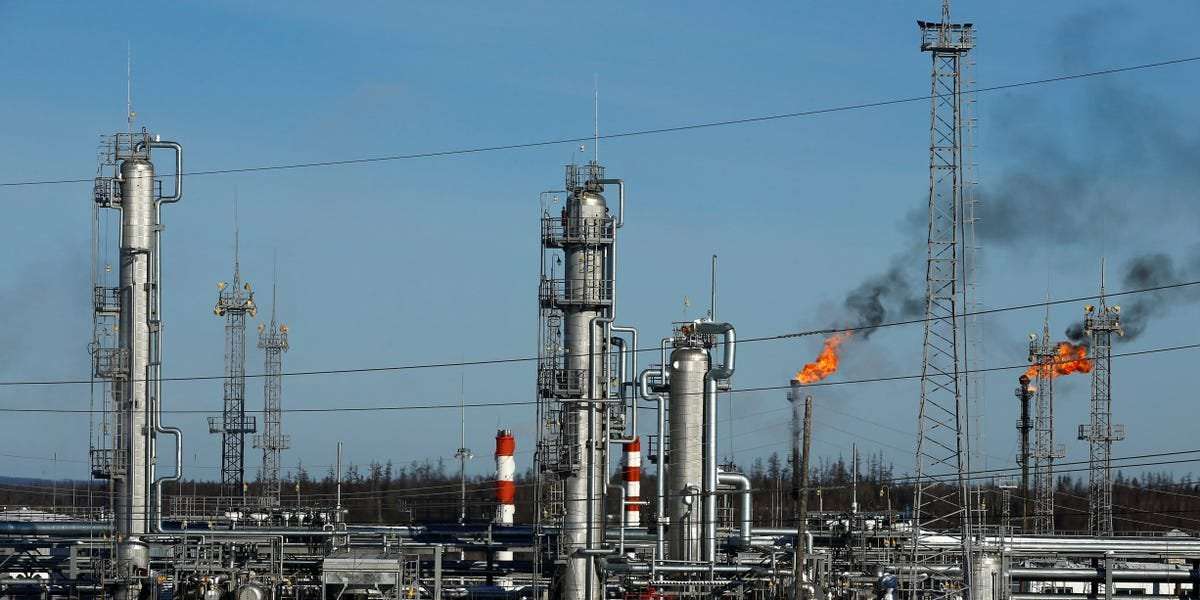A handful of EU countries say they have adequate reserves to wean themselves off Russian energy.
But a bloc-wide embargo on Russian supplies is a long way off and must be unanimously backed.
Germany, Poland, and Bulgaria have all signaled moves away from reliance on Russia for energy.
Sign up for our weekday newsletter, packed with original analysis, news, and trends — delivered right to your inbox. Loading Something is loading. Email address By clicking ‘Sign up’, you agree to receive marketing emails from Insider as well as other partner offers and accept our Terms of Service and Privacy Policy
As EU countries scramble to wean themselves off Russian energy, a trickle of member states have signaled that they are finding alternative sources of oil, coal, or gas and won't need to rely on Russia for long.
Russia's invasion of Ukraine on February 24 kick-started long-stagnating efforts to reduce the bloc's Russian energy dependence. But that dependence is profound: Russia supplied 41% of the EU's natural gas in 2019, the BBC reported.
Poland and Bulgaria issued defiant statements this week after Russia cut off their gas supplies. On Wednesday, both countries, though heavily dependent on Russian energy, said they could source enough alternatives.
"Bulgaria will not negotiate under pressure and with its head bowed," said Alexander Nikolov, Bulgaria's energy minister, the news outlet Novinite reported. "Bulgaria does not give in and is not sold at any price at any trade counterparty."
Austria's government also said on Wednesday that it would continue buying Russian energy, but that it was scrambling for alternative sources to fill its needs, Reuters reported.
The next day, the Czech Prime Minister Petr Fiala said the country had oil for three months, gas for two months, and nuclear reserves for two years, the Czech outlet iROZHLAS reported.
But while the Czech Republic doesn't buy directly from Russia's Gazprom, it is heavily dependent on energy sold by Russia through Western markets, the outlet reported.
Latvia, Estonia, and Lithuania were the first EU countries to cut themselves off from Russian gas on April 1, using underground Latvian reserves to satisfy demand, Euractiv reported. Days later, Finland announced it was on track to replace Russian gas sources by fall, the outlet also reported.
On Wednesday, German officials signaled that the country was preparing to stop buying Russian oil, as long as it was given enough time to secure alternatives, The Wall Street Journal reported.
For those countries without immediate alternatives, the transition is unlikely to happen quickly. Germany, for example, relies on Russia for about a third of its gas, Reuters reported.
And while Germany has an outsize influence in the European bloc, all 27 member states must agree to a full ban, and some are dragging their heels.
Hungary, whose authoritarian leader Viktor Orbán is broadly loyal to Putin, is one of the countries most dependent on Russian natural gas. Orbán also suggested that he would accede to a key Russian demand of paying Gazprom, Russia's major gas supplier, in rubles for its supply, Deutsche Welle reported.
And the question remains whether — even with the US and the EU united in their refusal to buy Russian energy in wartime — any ban can be truly effective.
On Wednesday, Bruegel, an economic think tank in Brussels, released a report that said it wouldn't be.
So far, the group wrote, the higher prices caused by the change in demand from Europe have more than compensated for Russia's losses.
"Only an immediate and full embargo would drastically cut Putin's revenues," the group wrote. This, it said, is unlikely given that major economies, such as China, show no sign of participating.
The group instead recommended energy import tariffs that could be adjusted to exert economic pressure on Russia.

Carighan on April 29th, 2022 at 15:59 UTC »
I'm impressed by my country, considering I barely have enough energy to get up in the morning. >.>
thejml2000 on April 29th, 2022 at 13:22 UTC »
The more work someone has to do to switch away from one provider to another, the less chance they’re ever going back.
This is true for energy as much as it’s true for jobs, healthcare providers, stores, restaurants, gas stations, whatever.
a.k.a. Russia shot themselves in the foot with this. After all the work to switch energy pipelines, go to renewables, whatever, they’re not going to flip back unless there’s some major issue with what they switched to.
Neverwherehere on April 29th, 2022 at 13:05 UTC »
I was wondering the other day whether or not Russia halting natural gas exports to Poland and Bulgaria would backfire and spur the EU to seek their energy needs elsewhere.